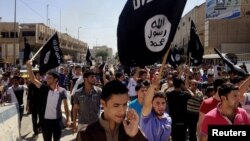Underestimated on the battlefield, the group known as the Islamic State is aiming to surprise the Western world again, trying to develop a state-like infrastructure that could help sustain its self-declared caliphate.
Obama administration officials consistently have dismissed such concerns, insisting Islamic State has yet to create anything close to the civic and financial systems associated with a well-functioning state.
They argue the group’s ambitions will outpace its resources over the long term, which, combined with the group’s brutality, will eventually doom it to failure.
Outside the administration, however, there is a growing consensus the Islamic State’s adaptability, creativity and staying power cannot be ignored.
"Their finances are in pretty good shape," said Ben Bahney, a researcher with the RAND Corp. "Over the next three to five years, they are more than capable of keeping things running."
And just as with some of the group’s recent military victories, like the takeover of Ramadi, the Islamic State seems to be pulling it off without many people.
"You are looking at a handful of guys in a back office somewhere keeping notes and writing memos," said Bahney.
Huge war chest
U.S. officials say the terror group's efforts have allowed it to generate tens of millions of dollars a month. Treasury Department estimates from earlier this year put the Islamic State’s cash reserve at about $500 million, though some estimates suggest it could be much higher, perhaps up to $2 billion, and likely stashed in eastern Syria.
And while much of the focus on the Islamic State has been on the group’s violence and recruiting, not all of that money is being pumped back into the group’s war machine.
"They are trying to maintain a modicum of infrastructure," Bahney said. "Communications clearly are important to the group. We have seen them keep hospitals running."
Aymenn Jawad Al-Tamimi, a fellow with the U.S.-based Middle East Forum, warns that the group’s efforts go even deeper.
"There is a lot of groundwork being done to solidify that state-like structure," Al-Tamimi said via Skype. "It’s certainly entrenching itself and there’s a quite clear evolution you can see over time in the Islamic State’s administrative structure, transcending something that was a lot more localized."
Even though some of Islamic State’s efforts may be nascent, Al-Tamimi warned that the more time goes by, the more the group’s bureaucracy will become entrenched in the fabric of daily life.
"People in Syrian rebel-held areas, for example, they will quite readily admit that people go do business in the Islamic State because they have ties in those territories. They have relatives," he said. "Buses can go in and out of Islamic State territory, sometimes on a daily route."
Organizational structure
Al-Tamimi said the group already has developed a centralized administration overseeing various departments, or Diwans, for education, public services and precious resources, like oil and antiquities. At times, the Diwans have issued orders that have been sent out to all of the group’s self-declared provinces.
"Because there is this state-like structure, it leaves plenty of avenues open for gaining income by taxing people for services, whether it’s garbage disposal, school registration fees and the like," he said. "You can’t really get rid of that unless you dismantle the state structure."
Unlike other terror or rebel groups in the region, the Islamic State has been vigilant about preserving, and profiting from, existing state structures. In Iraq, for example, the group has made a practice of keeping Iraqi government employees on the job, but then taxing their salaries up to 50 percent.
U.S. officials say the financial picture for the Islamic State is less than rosy with demands such as salaries for fighters, bureaucrats and teachers, and the need to provide basic services, like garbage collection, proving to be a drain.
"ISIL’s ability to sustain revenue streams to meet such demands is a constant challenge for them," a U.S. intelligence official told VOA. "The financial cost of running a self-declared caliphate is enormous."
The U.S. Treasury Department estimates the cost of paying its fighters likely is $10 million a month. Officials and analysts also point out the Islamic State appears to be making minimal investments in any infrastructure that could be targeted and destroyed by coalition airstrikes.
In addition, there also are doubt as to the extent civilians in areas under Islamic State control are willingly buying into the idea they are living in a sustainable caliphate.
"The group’s harsh governance and oppression of civilians is the only responsibility it appears to deem worthy of its attention," the intelligence official said.
Blood money
Matthew Levitt, a former deputy assistant secretary for intelligence and analysis at the U.S. Treasury Department, said it is the Islamic State’s oppression, in the form of "extortions and shakedowns," and not any state-like infrastructure, that has been filling the terror group’s coffers.
"Most of their funding is produced by criminal enterprises within Iraq," said Levitt, now with the Washington Institute. "It suggests they may not have a sustainable financial model."
Making long-term sustainability more difficult, U.S.-led efforts have helped to cut off any IS access to the international banking system. And the terror group’s self-hyped efforts to create its own currency appear to have made little real progress.
Given such obstacles, Bill Roggio, a senior fellow at the Foundation for Defense of Democracies, called the Islamic State’s financial capabilities nothing short of surprising.
"The operations are conducted on multiple fronts, as well as the occupation and management of the cities; it is a major financial burden," said Roggio. "We’re not seeing reports of people starving in areas where the Islamic State is. They’re not starving people out. There doesn’t seem to be a shortage of supplies and things of that nature."




